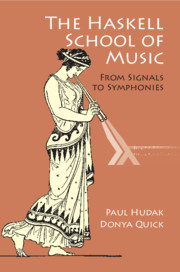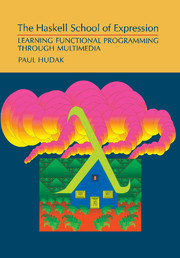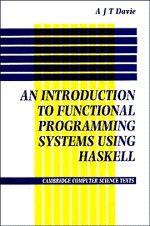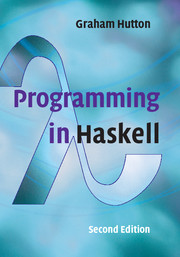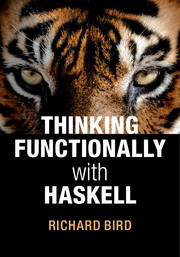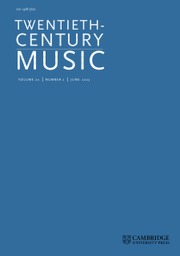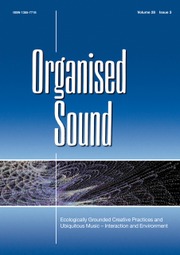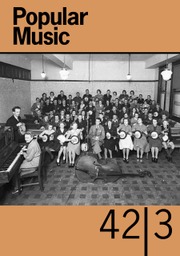The Haskell School of Music
From Signals to Symphonies
- Authors:
- Paul Hudak
- Donya Quick, Stevens Institute of Technology, New Jersey
- Date Published: October 2018
- availability: Available
- format: Hardback
- isbn: 9781108416757
Hardback
Other available formats:
eBook
Looking for an inspection copy?
This title is not currently available on inspection
-
This book explores the fundamentals of computer music and functional programming through the Haskell programming language. Functional programming is typically considered difficult to learn. This introduction in the context of creating music will allow students and professionals with a musical inclination to leverage their experience to help understand concepts that might be intimidating in more traditional computer science settings. Conversely, the book opens the door for programmers to interact with music by using a medium that is familiar to them. Readers will learn how to use the Euterpea library for Haskell (http://www.euterpea.com) to represent and create their own music with code, without the need for other music software. The book explores common paradigms used in algorithmic music composition, such as stochastic generation, musical grammars, self-similarity, and real-time interactive systems. Other topics covered include the basics of signal-based systems in Haskell, sound synthesis, and virtual instrument design.
Read more- Teaches functional programming languages through music, an accessible and engaging setting
- Teaches the Haskell programming languages, a powerful tool for applied mathematics and rapid prototyping
- Introduces music representation and algorithmic composition
Reviews & endorsements
'The selection of material is coherent and satisfying, and the book would be suitable for anyone with an interest in computer music, regardless of programming background.' Henrik Nilsson, University of Nottingham
See more reviews'Paul Hudak was both a world-leading functional programmer, and skilled jazz musician. This book brings together his two passions, by using Haskell as a domain-specific language for describing music. The result is a fascinating study in how computer science can illuminate art, and art can illuminate computer science.' Simon Peyton Jones, Microsoft Research
'This book is a joy. It should be in the library of every Haskell programmer and every musicologist interested in the underlying mathematics of music. Conceived and written by Paul Hudak, it was brought to fruition by Donya Quick. A fitting tribute to Paul and his lifetime's interests in both Haskell and music.' Richard Bird, University of Oxford
'Programming is the most direct and unrestricted way to tell computers how to behave and what to produce. With this book, the reader will not only learn, step by step, a modern programing language in Haskell, but will also understand how such a language can be tuned towards application in music. This legacy of Paul Hudak is one of the most vibrant and decisive calls for popularizing programming techniques as a new and powerful medium for the arts.' David Janin, University of Bordeaux
Customer reviews
Not yet reviewed
Be the first to review
Review was not posted due to profanity
×Product details
- Date Published: October 2018
- format: Hardback
- isbn: 9781108416757
- length: 398 pages
- dimensions: 235 x 156 x 26 mm
- weight: 0.68kg
- availability: Available
Table of Contents
1. Computer music, Euterpea, and Haskell
2. Simple music
3. Polymorphic and higher-order functions
4. A musical interlude
5. Syntactic magic
6. More music
7. Qualified types and type classes
8. From music to MIDI
9. Interpretation and performance
10. Self-similar music
11. Proof of induction
12. An algebra of music
13. L-Systems and generative grammars
14. Random numbers … and Markov chains
15. Basic input/output
16. Higher-order types and monads
17. Musical user interfaces
18. Sound and signals
19. Euterpea's signal functions
20. Spectrum analysis
21. Additive and subtractive synthesis
22. Amplitude and frequency modulation
23. Physical modeling.
Sorry, this resource is locked
Please register or sign in to request access. If you are having problems accessing these resources please email [email protected]
Register Sign in» Proceed
You are now leaving the Cambridge University Press website. Your eBook purchase and download will be completed by our partner www.ebooks.com. Please see the permission section of the www.ebooks.com catalogue page for details of the print & copy limits on our eBooks.
Continue ×Are you sure you want to delete your account?
This cannot be undone.
Thank you for your feedback which will help us improve our service.
If you requested a response, we will make sure to get back to you shortly.
×
